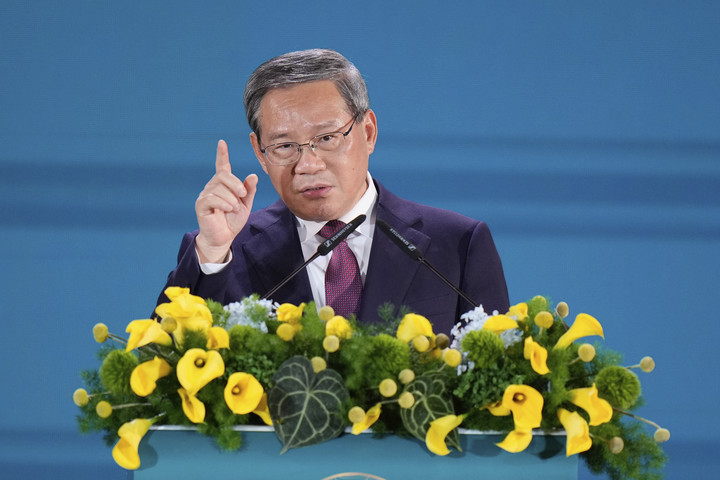Chinese Premier Li Qiang announces end to special negotiation privileges at GDI high-level meeting
Move signals tacit acceptance of developed status amid ongoing US-China trade disputes

China has declared it will forgo the negotiation advantages it once enjoyed as a developing country within the World Trade Organization (WTO), signaling a major shift in its global economic positioning.
According to Xinhua News Agency, Premier Li Qiang announced on September 24 at the Global Development Initiative (GDI) high-level meeting in the United States, "China will no longer seek new special and differential treatments in all current and future WTO negotiations." This marks a departure from China’s previous assertion of its developing country status, which had allowed it various flexibilities and leniencies under WTO rules.
Although not an official renunciation of its developing country designation, the statement is widely interpreted as a practical abandonment of that status. For years, the United States has criticized China for leveraging the benefits of a developing country despite boasting the world's second-largest economy.
Within the WTO, developing country status is self-declared, without strict qualifying criteria. China had used this position to receive certain delays or gradual obligations in fulfilling international trade rules.
South Korea, for its part, voluntarily gave up its developing country status in October 2019, after having declared it upon joining the WTO in 1995. In that year, then-U.S. President Donald Trump criticized several countries, including China, for exploiting the developing country category to gain unfair trade benefits—a move that influenced Korea's decision.
Reuters noted that the announcement comes amid persistent trade tensions between the United States and China, fueled by broad tariffs imposed by both sides. Bloomberg also analyzed that China's move is likely aimed at resolving lingering controversies over its WTO status, a recurring sticking point in global trade negotiations.
Note “This article was translated from the original Korean version using AI assistance, and subsequently edited by a native-speaking journalist.”
Photo=Yonhap News
추천 뉴스
- 1 Chef of the Tyrant Tops Netflix Global Charts for Second Consecutive Week The Korean drama series "Chef of the Tyrant," starring Lim Yoon-a and Lee Chae-min, has held its position at the top of Netflix’s global charts for non-English TV shows for the second consecutive week.According to the international streaming chart aggregator Tudum on September 24, "Chef of the Tyran
- 2 Presidential Office Discloses Special Activity Expenses for the First Time Under Lee Jae-myung Administration For the first time since the launch of the Lee Jae-myung administration, the Office of the President has released a detailed report on the official use of its special activity fund. The disclosed figures offer a closer look into how confidential expenses—often labeled as ‘opaque budgets’—were alloca
- 3 Accordion Virtuoso Lee Chul-ok to Celebrate 10th Anniversary with Special Concert Professor Lee Chul-ok, Korea’s leading accordionist, is poised to host a special commemorative performance to mark a decade of his ensemble’s contributions to popularizing the accordion in Korea.The “Lee Chul-ok Accordion Concert With Acomuse” will take place at 7:00 p.m. on October 28 at the Chambe
- 4 Mabinogi Mobile Unveils Major Overhaul to Combat System in Season 1, Raising Level Cap to 85 DevCat and Nexon have unveiled the first major update for the new MMORPG "Mabinogi Mobile" through their online showcase titled "Big Campfire." Announced on September 22, the Season 1 roadmap promises not only fresh content, but also a dramatic shake-up of the combat system and growth mechanics.The
- 5 David Beckham and BOSS Unveil Second Collaboration, Merging Urban and Natural Elements in F/W Collection BOSS and global icon David Beckham have officially revealed their second collaborative collection.On September 23, premium lifestyle brand HUGO BOSS announced the launch of the second "BECKHAM x BOSS Collection" for the Fall/Winter 2025 season, created in partnership with David Beckham.For this seas
- 6 President Lee Jae-myung Embarks on U.S. Visit to Attend United Nations General Assembly President Lee Jae-myung has commenced his official visit to the United States to attend the United Nations General Assembly, embarking on a five-day trip beginning September 22 (local time) in New York.Upon arrival, President Lee held meetings with Larry Fink, CEO of BlackRock—the world’s largest as
- 7 President Lee Jae-myung Distributes Chuseok Gifts Symbolizing National Unity and Livelihood Recovery President Lee Jae-myung has celebrated his first Chuseok in office by delivering gifts intended to foster national unity and support the recovery of livelihoods to a wide range of social groups.On the 23rd, the Presidential Office announced that President Lee had sent gifts to various segments of so
- 8 Up to 49% Off: Korea Tourism Organization Unveils 19 Autumn Travel Packages This autumn, the Korea Tourism Organization is launching a set of special local travel packages designed to showcase the rich charms found in every corner of the country.On September 22, the Ministry of Culture, Sports and Tourism and the Korea Tourism Organization (KTO) announced the debut of speci
- 9 Seoul International Fireworks Festival to Attract a Million Spectators; City Implements Major Transport Restrictions The city of Seoul is putting the entire Hangang (Han River) area under special management to maintain order and safety during the impending influx of visitors to the Seoul International Fireworks Festival.On the day of the 2025 Seoul International Fireworks Festival, set for the 27th, all operations
- 10 NEXZ Underscores Global Hot Trend with Consecutive 'TMA' Win and First Solo Concert JYP Entertainment boy group NEXZ further cemented their global popularity by winning the "Global Hot Trend" award at the 2025 The Fact Music Awards (TMA). The group, composed of Tomoya, Yu, Haru, So Gun, Seita, Hui, and Yuki, took the stage at the 2025 TMA ceremony held at the Outdoor Performance Ve
